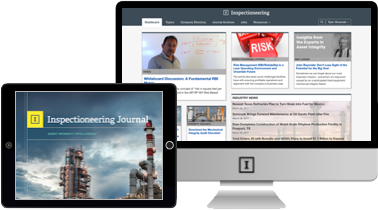Introduction
I have written numerous technical articles addressing how to improve your fixed equipment mechanical integrity (FEMI) program. This time I will deviate from the FEMI technologies and methodologies to address a topic that may be equally important to improving your FEMI program – managing your manager(s). If you do not manage your manager(s) well, you may end up with insufficient resources (physical and human) to move your FEMI program from one that is barely adequate or mediocre, up to one that is truly excellent in meeting the business needs at your operating site. And when I refer to “manager(s)” (plural), I mean not only your immediate supervisor/manager, but possibly those above your direct supervisor/manager who may also have some of the same knowledge short-comings about FEMI issues and programs.
I know it may sound a bit strange to think in terms of managing your manager(s), but it is very important, especially when some types of managers do not really understand or appreciate the criticality of the FEMI role in meeting business needs. Some managers view the FEMI role at the operating site as a “necessary evil”, or at best, something they have to do in order to stay in compliance with rules and regulations. These types of managers need a lot of upward management and enlightenment from those of us who are dedicating our careers to seeking excellence in FEMI. I also know that it is easier for us FEMI specialists to manage FEMI programs and activities than it is to manage our manager(s); but if we do not manage our manager(s) too, we could end up constantly “pushing on the rope”, as they say, without much success at improving our FEMI programs.
But what is excellence in FEMI? Those of you who have read previous articles I have written know full well that it is not “gold plating”, nor overdoing, nor spending excessively on the FEMI program. It is simply doing everything that needs to be done, when it needs to be done, and doing it in an effective manner, in order to create, implement, and sustain the FEMI program to avoid breaches of containment4. And what is compliance? If your manager(s) just wants “compliance”, whatever that is, then they may think they do not need to seek excellence in FEMI programs. But in my 45 years of experience in this business, I take a very dim view of those just seeking the minimalist approach for “compliance” with rules and regulations. First of all, with that approach they rarely ever achieve or stay in compliance, whether they want to admit it or not. And secondly, “compliance” is not the be-all, end-all of a successful business plan. Whereas, fixed equipment integrity and the subsequent fixed equipment reliability are part of a good business plan. It takes FEMI excellence to achieve both.
Different Types of FEMI Manager(s)
If you are really fortunate, you report to manager(s) (up to and including the plant manager) who fully embrace the need for excellence in FEMI programs in order to achieve the business plan and avoid suffering process safety incidents caused by fixed equipment failures. This type of manager is always seeking to improve their FEMI programs and they challenge us to do so. They “walk-the-talk” so that everyone knows that they support FEMI process safety programs just as strongly as they support personal safety programs and staying within the budget. They willingly supply the necessary resources to make FEMI program improvements and close any gaps in the FEMI program like CUI, soil-to-air interface corrosion, low-silicon carbon steel in sulfidation service, HTHA inspections, mix point inspections, etc. These are the type of managers that do not need much managing or enlightenment; we just need to keep them well informed of progress and FEMI issues.
On the other end of the spectrum of manager types are those who have little appreciation for, or knowledge of, the 101 essential elements of FEMI1. Their interest and focus generally lies elsewhere and these are the ones that need frequent communications from us FEMI specialists in order to keep them focused on what can happen if the FEMI program has gaps and/or is not adequately resourced. Sometimes they just do not understand or appreciate the risks associated with inadequate FEMI programs2 because they come from other backgrounds, such as rotating machinery, instrumentation and control, project or process engineering, maintenance, etc. They may not have had much exposure to FEMI risks, issues, and programs. Others may simply not believe there are significant risks associated with FEMI so they are more interested in funding new construction, new instrumentation, new machinery, etc. So it is up to us who are immersed in FEMI issues and risks to substantially raise their awareness and concern for FEMI risks. Most managers with FEMI accountability do not come by the necessary understanding of FEMI preventive programs by way of “assmosis”, that is, the act of sitting on FEMI reports and articles with the hope of absorbing them. It is up to us who understand the totality of FEMI issues to raise their awareness and understanding of the 101 essential elements of FEMI.
Some managers suffer from the syndrome of continuing crisis management. That is, some FEMI failure happens at the site, or perhaps another company site, or perhaps they heard that it happened at another company in our industry. So immediately the work atmosphere suffers from what I call managing the “hot rock of the moment”. FEMI specialists may be asked to “drop everything” to handle the new “hot rock of the moment” in order to keep the site from being “burned” by the “hot rock of the moment”. This type of crisis management sometimes results in pulling resources and focus off of other equally or even more important FEMI issues.
Which type of FEMI manager(s) do you have at your site?

















Comments and Discussion
Add a Comment
Please log in or register to participate in comments and discussions.